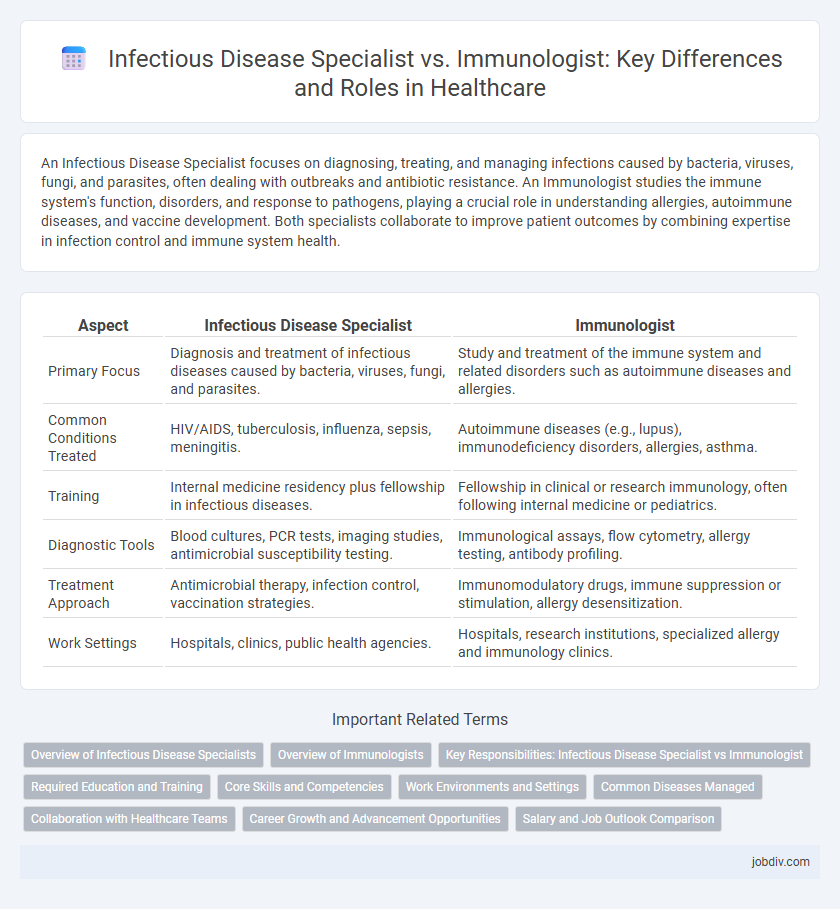An Infectious Disease Specialist focuses on diagnosing, treating, and managing infections caused by bacteria, viruses, fungi, and parasites, often dealing with outbreaks and antibiotic resistance. An Immunologist studies the immune system's function, disorders, and response to pathogens, playing a crucial role in understanding allergies, autoimmune diseases, and vaccine development. Both specialists collaborate to improve patient outcomes by combining expertise in infection control and immune system health.
Table of Comparison
| Aspect | Infectious Disease Specialist | Immunologist |
|---|---|---|
| Primary Focus | Diagnosis and treatment of infectious diseases caused by bacteria, viruses, fungi, and parasites. | Study and treatment of the immune system and related disorders such as autoimmune diseases and allergies. |
| Common Conditions Treated | HIV/AIDS, tuberculosis, influenza, sepsis, meningitis. | Autoimmune diseases (e.g., lupus), immunodeficiency disorders, allergies, asthma. |
| Training | Internal medicine residency plus fellowship in infectious diseases. | Fellowship in clinical or research immunology, often following internal medicine or pediatrics. |
| Diagnostic Tools | Blood cultures, PCR tests, imaging studies, antimicrobial susceptibility testing. | Immunological assays, flow cytometry, allergy testing, antibody profiling. |
| Treatment Approach | Antimicrobial therapy, infection control, vaccination strategies. | Immunomodulatory drugs, immune suppression or stimulation, allergy desensitization. |
| Work Settings | Hospitals, clinics, public health agencies. | Hospitals, research institutions, specialized allergy and immunology clinics. |
Overview of Infectious Disease Specialists
Infectious Disease Specialists diagnose and treat complex infections caused by bacteria, viruses, fungi, and parasites, often managing conditions like HIV/AIDS, tuberculosis, and sepsis. They possess specialized training in antimicrobial therapy and infection control, playing a critical role in hospital epidemiology and outbreak investigations. Their expertise complements Immunologists, who focus on the immune system's function and disorders such as allergies and autoimmune diseases.
Overview of Immunologists
Immunologists specialize in diagnosing and treating disorders related to the immune system, including allergies, autoimmune diseases, and immunodeficiencies. They conduct detailed evaluations of immune responses and develop therapies to enhance or suppress immune function according to patient needs. Their expertise complements infectious disease specialists by focusing on immune system mechanisms rather than solely on pathogens.
Key Responsibilities: Infectious Disease Specialist vs Immunologist
Infectious Disease Specialists diagnose, treat, and manage complex infections caused by bacteria, viruses, fungi, and parasites, often focusing on patient care in hospitals and clinics. Immunologists study the immune system's function and disorders, researching immune responses, developing vaccines, and treating autoimmune diseases. Both specialties collaborate to manage infectious diseases and immune-related conditions, with Infectious Disease Specialists emphasizing clinical treatment and Immunologists focusing on immune mechanisms and therapy development.
Required Education and Training
Infectious disease specialists complete a medical degree followed by a residency in internal medicine or pediatrics, then pursue a fellowship in infectious diseases to gain expertise in diagnosing and treating infections. Immunologists typically earn a medical degree or a PhD with specialized training in immunology, focusing on the immune system's functions and disorders through postdoctoral research or clinical fellowship programs. Both professions require rigorous education and advanced training, but infectious disease specialists emphasize clinical care while immunologists prioritize research and immune-related conditions.
Core Skills and Competencies
Infectious disease specialists possess expertise in diagnosing and managing complex infections, utilizing skills such as antimicrobial stewardship and outbreak investigation. Immunologists focus on understanding the immune system, emphasizing competencies in allergy assessment, autoimmune disease evaluation, and immunotherapy development. Both specialists require deep knowledge of pathophysiology, laboratory diagnostics, and patient-centered care to optimize treatment outcomes.
Work Environments and Settings
Infectious disease specialists primarily work in hospitals, clinics, and public health organizations, focusing on diagnosing and treating infections caused by bacteria, viruses, fungi, and parasites. Immunologists are often found in research laboratories, academic institutions, and pharmaceutical companies, where they study the immune system to develop treatments for autoimmune diseases, allergies, and immunodeficiencies. Both professionals collaborate in healthcare settings to improve patient outcomes through infection control and immune system management.
Common Diseases Managed
Infectious disease specialists primarily manage diseases such as HIV/AIDS, tuberculosis, malaria, and bacterial or viral infections like influenza and hepatitis, while immunologists focus on autoimmune disorders, allergies, immunodeficiencies, and vaccine-related immune responses. Both specialists play crucial roles in diagnosing and treating infections and immune system dysfunctions, tailoring therapies to address each patient's unique condition. Their expertise often overlaps in managing complex conditions that involve infection and immune system interactions.
Collaboration with Healthcare Teams
Infectious disease specialists and immunologists work closely with healthcare teams to diagnose, treat, and manage complex infections and immune-related conditions. Their collaboration enhances patient outcomes by integrating expertise in pathogen identification, immune response analysis, and personalized treatment plans. Effective communication between these specialists and multidisciplinary teams ensures coordinated care and rapid response to emerging health threats.
Career Growth and Advancement Opportunities
Infectious disease specialists and immunologists both offer significant career growth and advancement opportunities, with specialists often advancing through hospital leadership roles or academic research focusing on emerging pathogens and antimicrobial resistance. Immunologists frequently engage in cutting-edge research, biotechnology development, and clinical trials, which can lead to positions in pharmaceutical companies or prestigious research institutions. Both fields benefit from expanding global health concerns and innovations in immunotherapy, driving demand for expert knowledge and specialized skills.
Salary and Job Outlook Comparison
Infectious disease specialists earn an average salary of $220,000 annually, with steady job growth driven by emerging global health threats and increasing demand for disease control expertise. Immunologists typically make around $180,000 per year, benefiting from expanding roles in research and development of vaccines and immune therapies. Job outlook for infectious disease specialists is expected to grow 15% over the next decade, while immunologists experience a 12% growth rate due to rising investment in immunological research and treatment innovation.
Infectious Disease Specialist vs Immunologist Infographic

 jobdiv.com
jobdiv.com